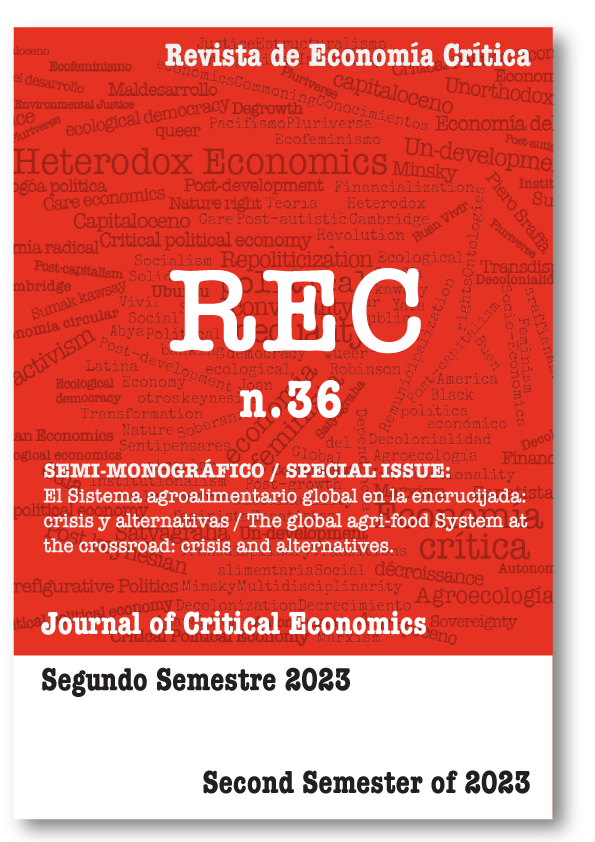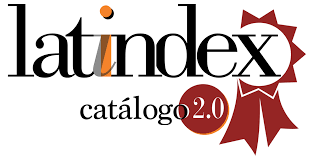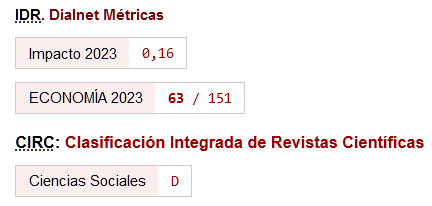Food Regime dynamics
DOI:
https://doi.org/10.46661/rec.10496Keywords:
food regimes, corporate food regime, food sovereignty, agroecologyAbstract
The 'food regime' concept distinguishes successive periods of global world-economic hegemony through the lens of food provisioning on a world scale. The late-nineteenth century British-centered food empire, provisioning Europe with grains and meat from the New World, was followed by the US-centered system of provisioning newly emergent Third World countries with cheap food exports to subsidize their development of national industrial sectors. With the subsequent rise of multi-national corporations and global banking, the 'corporate' food regime reorganized the world-economy around global food supply chains embodying the principle of 'comparative advantage.' Each period built on previous world-economic developments to establish a fully global food system. The current moment is undergoing two significant developments: (1) the rise of China as a substantial participant in the world food system via its Food Silk Road Initiative, by which it has established its own system of state-owned enterprises and trade routes to become the world's largest food importer; and (2) the recent 'corporate capture' of the United Nations by the World Economic Forum (WEF) via the 2021 UN Food System Summit. This was organized around replacing intergovernmental (multilateral) dialogue in the UN's Committee on World Food Security with 'multi-stakeholder' governance, privileging private decisions in intensifying industrial (and now digitized) agriculture in a process of 'de-territorialization' of farming. The recent pandemic revealed the fragility of global supply chains, disclosing (and enhancing) the wisdom of agro-ecological farming methods -- in both replenishing natural processes to combat climate emergency, and securing territorial food sovereignty, embodied in the vitality of robust nested food markets.
Downloads
References
Acharya, Amitav (2017). After Liberal Hegemony: The Advent of a Multiplex World Order. *Ethics & International Affairs*, September 8. https://www.ethicsandinternationalaffairs.org/2017/multiplexworldorder/
Arrighi, Giovanni (1990). The Three Hegemonies of Historical Capitalism. *REVIEW (Fernand Braudel Center)* 13(3): 365-408. Retrieved from: https://www.jstor.org/stable/i40009226.
Baviskar, Amita, & Michael Levien. (2021). Farmers' Protests in India: Introduction to the JPS Forum. *The Journal of Peasant Studies* 48(7): 1341-1355. https://doi.org/10.1080/03066150.2021.1998002 DOI: https://doi.org/10.1080/03066150.2021.1998002
Belesky, Paul, & Geoffrey Lawrence. (2018). Chinese State Capitalism and Neomercantilism in the Contemporary Food Regime: Contradictions, Continuity and Change. *The Journal of Peasant Studies* 46(6): 1119-1141. https://doi.org/10.1080/03066150.2018.1450242 DOI: https://doi.org/10.1080/03066150.2018.1450242
Buckley, Lila (2013). Chinese Agriculture Development Cooperation in Africa: Narrative and Politics. *IDS Bulletin* 44(4): 42-52. https://doi.org/10.1111/1759-5436.12041 DOI: https://doi.org/10.1111/1759-5436.12041
Canfield, Matthew, Molly D. Anderson, & Philip McMichael. (2021). UN Food Systems Summit 2021: Dismantling Democracy and Resetting Corporate Control of Food Systems. *Frontiers in Sustainable Food Systems* 5: 661552. https://doi.org/10.3389/fsufs.2021.661552 DOI: https://doi.org/10.3389/fsufs.2021.661552
Cave, Damien (2013). As cost of importing food soars, Jamaica turns to the Earth. *The New York Times*, August 4.
CFS. (2015). High-Level Report on Connecting Smallholders to Markets. Rome: Committee on World Food Security (FAO).
Chappell, Jahi (2018). Beginning to end hunger: Food and the environment in Belo Horizonte, Brazil, and beyond. Oakland: University of California Press. https://doi.org/10.1525/9780520966338 DOI: https://doi.org/10.1525/9780520966338
Da Vìa, Elisa (2012). Seed Diversity, Farmers' Rights, and the Politics of Re-Peasantization. *International Journal of Sociology of Agriculture and Food* 19(2): 229-242. doi:10.48416/ijsaf.v19i2.227.
De Schutter, Olivier, & Emile Frison. (2017). Modern agriculture cultivates climate change – we must nurture biodiversity. The Guardian, 9 January. Retrieved from https://www.theguardian.com/global-development/2017/jan/09/modern-agriculture-cultivates-climate-change-nurture-biodiversity-olivier-de-schutter-emile-frison
EAT-Lancet Commission. (2019). Food in the Anthropocene: Healthy diets from sustainable food systems. Retrieved from https://www.thelancet.com/journals/lancet/article/PIIS0140-6736(18)31788-4/fulltext
Fakhri, Michael (2022). The Food System Summit's Disconnection from People's Real Needs. Journal of Agricultural and Environmental Ethics, 3(35), 1–9. https://doi.org/10.1007/s10806-022-09882-7 DOI: https://doi.org/10.1007/s10806-022-09882-7
Farrer, Martin & Lily Kuo. (2019). 'Amazing Deal' or 'Capitulation'? Why the US-China Trade Truce May Not Last. The Guardian. Retrieved from https://www.theguardian.com/business/2019/dec/15/amazing-deal-or-capitulation-why-the-us-china-trade-truce-may-not-last
Friedmann, Harriet (2005). From colonialism to green capitalism: Social movements and the emergence of food regimes. In Buttel, F.H. & P. McMichael (Eds.), New Directions in the Sociology of Global Development, 11: pp. 229–67. Oxford: Elsevier.
Friedmann, Harriet, & Philip McMichael. (1989). Agriculture and the State System: The Rise and Fall of National Agricultures, 1870 to the Present. Sociologia Ruralis, 29(2): 93–117. https://doi.org/10.1111/j.1467-9523.1989.tb00360.x DOI: https://doi.org/10.1111/j.1467-9523.1989.tb00360.x
International Assessment of Agricultural Knowledge, Science and Technology for Development (IAASTD). (2008). Executive summary of the synthesis report. Retrieved from www.agassessment.org/docs/SR_Exec_Sum_280508_English.pdf
IPES-Food & ETC Group. (2021). A Long Food Movement: Transforming Food Systems by 2045. Retrieved from https://www.ipes-food.org/_img/upload/files/LongFoodMovementEN.pdf
Gaarde, Ingeborg (2017). Peasants Negotiating a Global Policy Space. La Vía Campesina in the Committee on World Food Security. Oxon, NY: Routledge. https://doi.org/10.4324/9781315444963 DOI: https://doi.org/10.4324/9781315444963
Gliessman, Steve (2018). Breaking Away from Industrial Food and Farming Systems: Seven Case Studies of Agroecological Transitions. IPES Food. Retrieved from https://www.ipes-food.org/_img/upload/files/CS2_web.pdf
Holt-Giménez, Eric (2019). Can We Feed the World Without Destroying It? Cambridge: Polity Press.
Khadse, Ashlesha, Peter Rosset, Helda Morales, & Bruce G. Ferguson. (2018). Taking Agroecology to Scale: The Zero Budget Natural Farming Peasant Movement in Karnataka, India. The Journal of Peasant Studies, 45(1): 192–219. https://doi.org/10.1080/03066150.2016.1276450 DOI: https://doi.org/10.1080/03066150.2016.1276450
Klein, Naomi (2007). The Shock Doctrine: The Rise of Disaster Capitalism. New York: Picador.
Lagi, Marco, Karla Bertrand, & Yaneer Bar-Yam. (2011). The food crises and political instability in North Africa and the Middle East. Cambridge, MA: New England Complex Systems Institute. https://doi.org/10.2139/ssrn.1910031 DOI: https://doi.org/10.2139/ssrn.1910031
Lee, Ching Kwan (2017). The Specter of Global China: Politics, Labor, and Foreign Investment in Africa. Chicago: University of Chicago Press. https://doi.org/10.7208/chicago/9780226340975.001.0001 DOI: https://doi.org/10.7208/chicago/9780226340975.001.0001
Mann, Alana (2021). Food in a Changing Climate. Bingley, UK: Emerald Publishing Limited. https://doi.org/10.1108/9781839827228 DOI: https://doi.org/10.1108/9781839827228
Mayes, Christopher (2018). Unsettling Food Politics: Agriculture, Dispossession and Sovereignty in Australia. London & New York: Rowman & Littlefield. DOI: https://doi.org/10.5040/9798881817121
McKeon, Nora (2018). Global Food Governance. Between Corporate Control and Shaky Democracy. Global Governance Spotlight, 2. Development and Peace Foundation. Retrieved from www.sef-bonn.org
McMichael, Philip (2013a). Food Regimes and Agrarian Questions. Halifax, NS: Fernwood Publishers. Retrieved from https://practicalactionpublishing.com/book/770/food-regimes-and-agrarian-questions. https://doi.org/10.3362/9781780448794.000 DOI: https://doi.org/10.3362/9781780448794.000
McMichael, Philip (2013b). Land Grabbing as Security Mercantilism in International Relations. Globalizations, 10(1): 47–64. https://doi.org/10.1080/14747731.2013.760925 DOI: https://doi.org/10.1080/14747731.2013.760925
McMichael, Philip (2020). Does China's 'Going Out' Strategy Prefigure a New Food Regime? The Journal of Peasant Studies, 47(1): 116–154. https://doi.org/10.1080/03066150.2019.1693368 DOI: https://doi.org/10.1080/03066150.2019.1693368
McMichael, Philip (2023). Critical Agrarian Studies and Crises of the World-Historical Present. The Journal of Peasant Studies, 50(2): 725–757. https://doi.org/10.1080/03066150.2022.2163630 DOI: https://doi.org/10.1080/03066150.2022.2163630
Nestle, Marion (2022). Regulating the Food Industry: An Aspirational Agenda. American Journal of Public Health, 112(6): 853-858. https://doi.org/10.2105/AJPH.2022.306844 DOI: https://doi.org/10.2105/AJPH.2022.306844
Ong, Aihwa (2006). Neoliberalism as Exception. Mutations in Citizenship and Sovereignty. Durham & London: Duke University Press. https://doi.org/10.1515/9780822387879 DOI: https://doi.org/10.1515/9780822387879
Patel, Raj & Philip McMichael. (2009). A Political Economy of the Food Riot. REVIEW (Fernand Braudel Center), XXXII(1): 9–36.
Philpott, Tom (2020). Precarious Bounty: The Looming Collapse of American Farming. London: Bloomsbury. https://doi.org/10.5040/9781635572865 DOI: https://doi.org/10.5040/9781635572865
Pieterse, Jan Nederveen (2018). Multipolar Globalization. Emerging Economies and Development. New York: Routledge.
Roberts, Wayne (2008). The No-Nonsense Guide to World Food. Oxford: New Internationalist.
Rosset, Peter M., & Miguel A. Altieri. (2017). Agroecology. Science and Politics. Black Point, NS: Fernwood Publishing. https://doi.org/10.3362/9781780449944.000 DOI: https://doi.org/10.3362/9781780449944.000
Schiavoni, Christina M. (2017). The contested terrain of food sovereignty construction: Towards a historical, relational, and interactive approach. The Journal of Peasant Studies, 44(1): 1–32. https://doi.org/10.1080/03066150.2016.1234455 DOI: https://doi.org/10.1080/03066150.2016.1234455
Schwab, Klaus (2019). Why We Need the 'Davos Manifesto' for a Better Kind of Capitalism. Retrieved from https://www.weforum.org/agenda/2019/12/why-we-need-the-davos-manifesto-for-better-kind-of-capitalism/
Schwab, Klaus & Thierry Malleret. (2020). Covid-19: The Great Reset. Forum Publishing. Retrieved from http://reparti.free.fr/schwab2020.pdf
Shah, Amod, & Katie Sandwell. (2021). Lessons from the Indian Farmers' Movement: Emerging Solidarities in the Kisan Andolan. Amsterdam: Transnational Institute.
Swanson, Ana (2019). Trump Cripples W.T.O. as Trade War Rages. The New York Times. Retrieved from https://www.nytimes.com/2019/12/08/business/trump-trade-war-wto.html
Tortajada, Cecilia & Hongzhou Zhang. (2021). When Food Meets BRI: China's Emerging Food Silk Road. Global Food Security, 29: 1–13. https://doi.org/10.1016/j.gfs.2021.100518 DOI: https://doi.org/10.1016/j.gfs.2021.100518
Trauger, Amy (2014). Toward a political geography of food sovereignty: Transforming territory, exchange and power in the liberal sovereign state. The Journal of Peasant Studies, 41(6): 1131–1152. https://doi.org/10.1080/03066150.2014.937339 DOI: https://doi.org/10.1080/03066150.2014.937339
United Nations Conference on Trade and Development and United Nations Environment Programme. (2008). Organic Agriculture and Food Security in Africa. New York: United Nations.
Sustainability in an Era of Empire and Globalization. London: Earthscan.
van der Ploeg, Jan Douwe, & Jingzhong Ye. (2016). China’s Peasant Agriculture and Rural Society. Changing Paradigms of Farming. London & New York: Routledge. https://doi.org/10.4324/9781315643250
von Braun, Joachim, Kaosar Afsana, Louise O. Fresco, and Mohamed Hag Ali Hassan. (2021). Food Systems: Seven Priorities to End Hunger and Protect the Planet. Nature, 597: 28–30. https://doi.org/10.1038/d41586-021-02331-x DOI: https://doi.org/10.1038/d41586-021-02331-x
WEF Institutional Brochure. (2013). Retrieved from https://www3.weforum.org/docs/WEF_InstitutionalBrochure.pdf
Wittman, Hanna & Jennifer Blesh. (2017). Food sovereignty and Fome Zero: Connecting public food procurement programmes to sustainable rural development in Brazil. Journal of Agrarian Change, 17(1): 81–105. https://doi.org/10.1111/joac.12131 DOI: https://doi.org/10.1111/joac.12131
Zhan, Shaohua (2022). China and Global Food Security. Cambridge: Cambridge University Press. https://doi.org/10.1017/9781108914680 DOI: https://doi.org/10.1017/9781108914680
Downloads
Published
How to Cite
Issue
Section
License
Copyright (c) 2023 Philip McMichael

This work is licensed under a Creative Commons Attribution 4.0 International License.
This licence allows third parties to share (copy and redistribute the material in any medium or format) and adapt (remix, transform and create from the material for any purpose, including commercial purposes), provided that authorship and first publication in this journal (The Journal, DOI of the work) is acknowledged, a link to the licence is provided, and it is stated whether changes have been made to the work.







